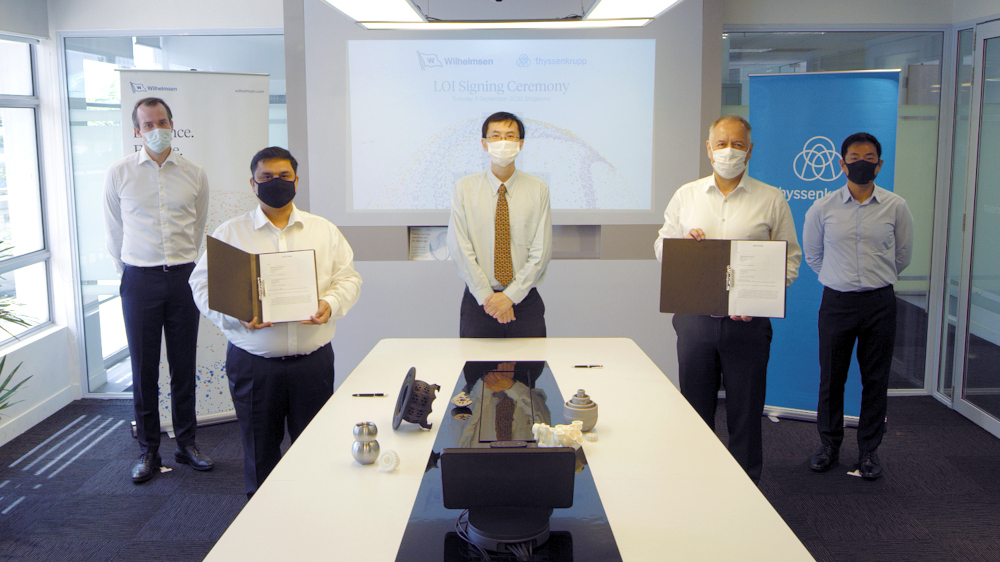
Norway’s maritime industry group Wilhelmsen and Germany’s industrial and technology businesses conglomerate thyssenkrupp are establishing a 3D printing joint venture targeting the maritime industry.
On 28 September, Wilhelmsen’s Marine Products division and thyssenkrupp signed a joint venture letter of intent (LOI) in an effort “to re-examine and optimize the production and delivery process of 3D printed spare parts for the unique demands of the maritime market”.

As explained, utilizing thyssenkrupp’s expertise in additive manufacturing, alongside Wilhelmsen’s maritime service and supply know-how, the maritime company’s recent experiences from its 3DP Early Adopter Program will be an important steppingstone for the new venture.
Back in December 2019, Wilhemsen’s Marine Products division launched the program where clients have exclusive access to on-demand additive manufacturing. Two months later, an ore carrier newbuild owned by Berge Bulk, received the world’s first commercial delivery of 3D printed scupper plugs.
Based on current data, the maritime industry spends billions of dollars every year on spare parts — with 50% of these vessels are older than 15 years, the availability of parts is limited.
This makes the fulfillment of orders for maritime spare parts costly and complicated, and in fact, the supply chain overheads involved may often far outstrip the cost of the part itself. Moreover, traditional manufacturing processes such as machining and casting often involve long lead-times stretching into months. The traditional model of manufacturing and distribution of spare parts has largely remained unchallenged for decades, until now.
“We are very excited to enter the next phase of our 3D printing journey, hand in hand with thyssenkrupp. With this joint venture we believe we will take the lead as the de-facto supplier of 3D printed maritime spare parts, continuing to bring the benefits of AM technology to shipping companies by reducing the cost of spare parts, lead times and environmental footprint,” Hakon Ellekjaer, Head of Venture, 3D Printing, Wilhelmsen, commented.
Additive manufacturing, or 3D printing, disrupts the costly and time-consuming spare parts status quo, as suitable components are fabricated near the vessel location in a matter of weeks, sometimes days.
“We are already seeing a very positive response from our maritime customers on the additive manufacturing adoption,” Abhinav Singhal, Director of thyssenkrupp Innovations, said.
“They are realising the benefits from faster lead times, reduced costs and having more resilience in their spare parts supply chain. This is going to be a true gamechanger for the maritime industry and we are proud to offer it alongside Wilhelmsen.”
Expected to be headquartered in Singapore, the JV will serve the key port locations around the world, offering a customized, on demand and more efficient process of obtaining selected spare parts.
In addition to the collaboration with thyssenkrupp, Wilhelmsen said it continues to work with additive manufacturing company Ivaldi Group on a number of 3D printing software applications.
In June 2020, Wilhelmsen also signed a memorandum of understanding (MOU) with Singapore-based drone delivery provider F-drones for last mile delivery of its 3D printed spare parts. As the only drone delivery provider currently authorized by the Civil Aviation Authority of Singapore (CAAS) to execute drone deliveries Beyond-Visual-Line-of-Sight (BVLOS) to vessels at anchorage, the agreement with F-drones has enabled Wilhelmsen to broaden the scope of its on-demand additive manufacturing service.
The post Wilhelmsen, thyssenkrupp create 3D printing JV for maritime sector appeared first on Offshore Energy.
